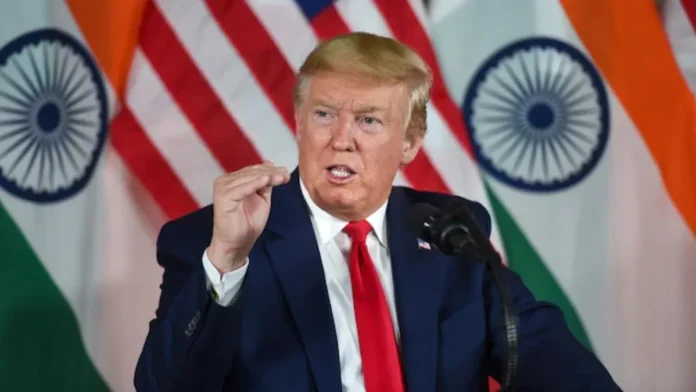Former U.S. President Donald Trump has once again taken aim at India’s trade policies, specifically targeting what he describes as the country’s “high tariffs” on American goods. In a bold new pitch to voters ahead of the 2024 U.S. presidential election, Trump has promised to implement a “reciprocal tax” on Indian imports if he returns to the White House. This proposed tax, according to Trump, would be a measure to counterbalance India’s alleged unfair trade practices, especially its tariffs on products such as Harley-Davidson motorcycles and other American goods.
As Trump seeks to regain his presidency, his rhetoric on trade and tariffs is reminiscent of his first term, where he frequently advocated for more aggressive trade policies, not just with India but also with China, Europe, and other global powers. His focus on reciprocal taxes is a clear sign that he plans to revive his “America First” agenda, positioning himself as a protector of American industries and workers.
Trump’s Criticism of India’s Tariff Policies
India has long been a point of contention in Trump’s trade narrative. During his first term, he repeatedly criticized India for imposing high tariffs on U.S. goods, particularly in sectors like motorcycles, automobiles, and agriculture. The case of Harley-Davidson became a symbolic example of this trade friction. In 2019, Trump frequently brought up India’s 100% tariff on Harley-Davidson motorcycles, calling it “unacceptable” and “unfair.”
Although India reduced the tariff on Harley-Davidson bikes to 50%, Trump continued to express dissatisfaction, claiming that even reduced tariffs were still disproportionately high. In his latest campaign speeches, Trump has resurrected this issue, asserting that India’s tariffs hurt American businesses and workers by making U.S. exports less competitive in the Indian market.
Trump’s proposed “reciprocal tax” would, in theory, match India’s tariffs with equal duties on Indian goods entering the U.S. market. He has suggested that such a policy would create a more level playing field and force India to rethink its high tariff rates. “For every product India taxes us on, we will tax them equally,” Trump told supporters at a recent rally, signaling his commitment to using tariffs as a tool to leverage trade negotiations.
The U.S.-India Trade Relationship
India is one of the United States’ key trading partners, with bilateral trade amounting to more than $125 billion in 2023. The relationship has grown significantly in recent years, particularly in sectors like technology, pharmaceuticals, and defense. However, trade tensions have periodically flared up, largely due to tariff disputes and market access issues.
India maintains a relatively protectionist stance in several sectors, including agriculture, automotive, and technology, which has prompted criticism from U.S. businesses and politicians. While Trump is vocal about India’s tariffs, he has also emphasized that India needs to open its markets further to U.S. exports.
During his first term, Trump’s administration removed India from the Generalized System of Preferences (GSP), a program that allowed duty-free access for many Indian goods. This move was a direct response to what the U.S. saw as India’s failure to provide “equitable and reasonable access” to its markets for American goods. Despite this, the two countries have maintained strong economic ties, particularly in defense and strategic partnerships, which have grown under both Trump and his successor, President Joe Biden.
The Impact of a Reciprocal Tax
If implemented, a reciprocal tax on Indian goods could have significant ramifications for the U.S.-India trade relationship. Indian exports to the U.S. include a wide range of products, from textiles and pharmaceuticals to IT services and machinery. A reciprocal tax could potentially affect these sectors, leading to higher costs for Indian goods in the American market.
On the flip side, Indian tariffs on U.S. goods, especially in agriculture and manufacturing, could face a similar response, disrupting supply chains and affecting pricing in both countries. The possibility of a tariff war, reminiscent of the U.S.-China trade conflict during Trump’s first term, could escalate tensions between Washington and New Delhi. However, it is also possible that the threat of reciprocal taxes could serve as a bargaining chip, encouraging India to reduce its tariffs voluntarily to avoid a trade conflict with the U.S.
Political Strategy Behind Trump’s Trade Pitch
For Trump, attacking India’s tariffs serves as a dual strategy: it reinforces his “tough on trade” image, a core aspect of his political brand, while also appealing to key voter bases. By focusing on reciprocal taxes, Trump is likely aiming to win over blue-collar workers and industries that have felt the brunt of global trade imbalances, particularly in the manufacturing and agricultural sectors.
His message of economic nationalism resonates with voters who believe that American businesses have been disadvantaged by unfair foreign trade practices. By positioning himself as the candidate who will stand up to countries imposing high tariffs on U.S. goods, Trump is trying to differentiate himself from President Biden and other candidates who may pursue more traditional diplomatic approaches to trade issues.
Donald Trump’s latest proposal of a reciprocal tax against India’s “high tariffs” is a continuation of his “America First” economic policies, aimed at protecting U.S. industries and workers. As the 2024 election approaches, this issue will likely play a significant role in his campaign, particularly as trade continues to be a hot-button topic for American voters. Whether or not this strategy succeeds will depend on the political and economic landscape in the months ahead, but one thing is certain: the U.S.-India trade relationship will be a critical factor in Trump’s pitch to voters.

